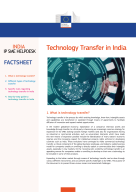Details
- Publication date
- 19 January 2023
- Author
- European Innovation Council and SMEs Executive Agency
- Publication type
- Factsheet
Description
Technology transfer is the process by which existing knowledge, know-how, intangible assets and capabilities are transferred or exploited through means of agreements to facilitate diffusion of innovation and expand market opportunities. In the modern globalised economy, exploitation of a company’s technical assets and knowledge through transfer to a third party is becoming an increasingly common strategy for expansion for EU SMEs looking towards foreign markets (and also for organisations having no industrial or commercial activities, such as universities). Elements which have made this new means of expansion possible include the liberalisation of many nations’ economic regimes and the increasing respect for intellectual property rights enforced in developing countries such as India. These evolutions have converged to make commercial technology transfer a critical component of the global business landscape, and indeed a viable business model for companies unable or unwilling to directly exploit or commercialise their intangible assets, especially in new markets. On the ‘receiving side’, evidently, technology transfer is an appealing avenue for companies unable or unwilling to develop on their own a technology to be included in some of their products. Expanding to the Indian market through means of technology transfer can be done through various different instruments, and can present specific challenges to EU SMEs. The purpose of this document is to present these various means and associated challenges.

